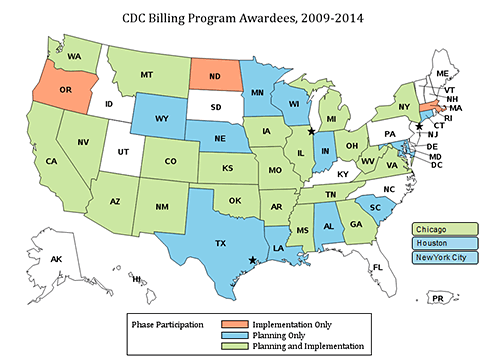Developing Mechanisms for Billing
Innovative Projects to Improve Reimbursement for Immunization Services Provided by Public Health Department Clinics
Billables Success Stories
Strategies used by health departments to build successful billing programs.
CDC’s billing program has been supported through the federally legislated American Recovery and Reinvestment Act of 2009 (ARRA) and the Affordable Care Act Prevention and Public Health Fund (PPHF), as well as 317 funds. Since 2009, it has enabled project awardees to develop plans that will enable them to bill for vaccine services. Each billing program awardee organization develops a public health action plan describing activities, protocols, and procedures needed to pilot, initiate, and sustain a successful billing effort within the immunization program.
Status as of December 2016:
- 38 awardees have received funding for planning, implementation, or both.
- Implementation awardees supported to develop billing systems are currently at various stages of billing:
- Most awardees have demonstrated the ability to contract with both public and private payers.
- 32 awardees are able to bill Medicaid and 31 are able to bill Medicare specifically for flu vaccine.
- An article describing CDC’s Billables Project was published in the July/August 2014 issue of the Journal of Health Management and Practice [1].
- At least six states which have participated in the billing program have also seen legislation pass to support the ability of local health departments and clinics to bill for immunization services.
- In 2011, the National Association of County and City Health Officials (NACCHO) developed a Billing Toolbox, which is available online and has been consistently updated to include materials developed by billing program awardees (see Billing Resources).
- In August 2012, CDC conducted a three-part series of training on billing concepts in conjunction with America’s Health Insurance Plans (AHIP) (see Billing Resources).
- In 2013, stakeholder meetings were held in Washington, DC, and Atlanta, Georgia, to allow payers, awardees, and partner organizations to share knowledge and resources. Those meetings facilitated contracting opportunities between some awardees and payers.
The majority of immunization grantees that have conducted planning and implementation of billing programs have shown the capacity to bill for immunization services. However, they continue to face barriers to full implementation, which means billing all payers for all vaccine and administration costs for all patients in health departments across their jurisdictions.
Footnote
- Kilgus DK, Redmon GS. Enabling reimbursement to health departments for immunization services. J Public Health Manag Pract. 2014;20(4):453-5. Doi:10.1097/PHH.0b013e3182a9dc03.

Related Pages
- Page last reviewed: December 13, 2016
- Page last updated: April 12, 2017
- Content source:


 ShareCompartir
ShareCompartir